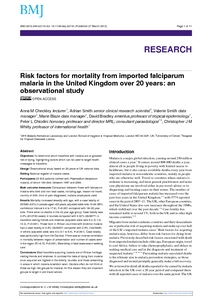Checkley, AM; Smith, A; Smith, V; Blaze, M; Bradley, D; Chiodini, PL; Whitty, CJ
(2012)
Risk factors for mortality from imported falciparum malaria in the United Kingdom over 20 years: an observational study.
BRITISH MEDICAL JOURNAL, 344.
- (11).
ISSN 1756-1833
https://doi.org/10.1136/bmj.e2116
SGUL Authors: Checkley, Anna Mary
![[img]](https://openaccess.sgul.ac.uk/103455/1.hassmallThumbnailVersion/bmj.e2116.pdf)  Preview |
|
["document_typename_application/pdf; charset=binary" not defined]
Published Version
Download (381kB)
| Preview
|
Abstract
Objectives To determine which travellers with malaria are at greatest risk of dying, highlighting factors which can be used to target health messages to travellers.
Design Observational study based on 20 years of UK national data.
Setting National register of malaria cases.
Participants 25 054 patients notified with Plasmodium falciparum malaria, of whom 184 died, between 1987 and 2006.
Main outcome measures Comparison between those with falciparum malaria who died and non-fatal cases, including age, reason for travel, country of birth, time of year diagnosed, malaria prophylaxis used.
Results Mortality increased steadily with age, with a case fatality of 25/548 (4.6%) in people aged >65 years, adjusted odds ratio 10.68 (95% confidence interval 6.4 to 17.8), P<0.001 compared with 18–35 year olds. There were no deaths in the ≤5 year age group. Case fatality was 3.0% (81/2740 cases) in tourists compared with 0.32% (26/8077) in travellers visiting friends and relatives (adjusted odds ratio 8.2 (5.1 to 13.3), P<0.001). Those born in African countries with endemic malaria had a case fatality of 0.4% (36/8937) compared with 2.4% (142/5849) in others (adjusted odds ratio 4.6 (3.1 to 9.9), P<0.001). Case fatality was particularly high from the Gambia. There was an inverse correlation in mortality between region of presentation and number of cases seen in the region (R2=0.72, P<0.001). Most delay in fatal cases was in seeking care.
Conclusions Most travellers acquiring malaria are of African heritage visiting friends and relatives. In contrast the risks of dying from malaria once acquired are highest in the elderly, tourists, and those presenting in areas in which malaria is seldom seen. Doctors often do not think of these as high risk groups for malaria; for this reason they are important groups to target in pre-travel advice.
| Item Type: |
Article
|
| Additional Information: |
Copyright © Checkley et al 2012
This is an open-access article distributed under the terms of the Creative Commons Attribution Non-commercial License, which permits use, distribution, and reproduction in any medium, provided the original work is properly cited, the use is non commercial and is otherwise in compliance with the license. See: http://creativecommons.org/licenses/by-nc/2.0/ and http://creativecommons.org/licenses/by-nc/2.0/legalcode. |
| Keywords: |
Adolescent, Adult, Africa, Age Distribution, Aged, Antimalarials, Child, Child, Preschool, Emigration and Immigration, Female, Great Britain, Humans, Malaria, Falciparum, Male, Middle Aged, Retrospective Studies, Risk Factors, Survival Rate, Travel, Young Adult, Science & Technology, Life Sciences & Biomedicine, Medicine, General & Internal, General & Internal Medicine, MEDICINE, GENERAL & INTERNAL, PLASMODIUM-FALCIPARUM, SURVEILLANCE DATA, TRAVELERS, IMMUNITY, IMMIGRANTS, GUIDELINES, CHRISTMAS, TANZANIA, DISEASES, DEATHS |
| SGUL Research Institute / Research Centre: |
Academic Structure > Infection and Immunity Research Institute (INII) |
| Journal or Publication Title: |
BRITISH MEDICAL JOURNAL |
| ISSN: |
1756-1833 |
| Related URLs: |
|
| Dates: |
| Date | Event |
|---|
| 27 March 2012 | Published |
|
| Web of Science ID: |
WOS:000302603100003 |
  |
Download EPMC Full text (PDF)
|
 |
Download EPMC Full text (HTML)
|
| URI: |
https://openaccess.sgul.ac.uk/id/eprint/103455 |
| Publisher's version: |
https://doi.org/10.1136/bmj.e2116 |
Statistics
Item downloaded times since 26 Mar 2014.
Actions (login required)
 |
Edit Item |



